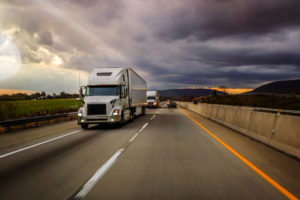By Jeremy B. White, Politico
SACRAMENTO, Calif. — California Democrats trying to slow the rollout of driverless trucks are facing a powerful opponent: Gov. Gavin Newsom.
The Democratic governor and longtime Silicon Valley evangelist has sided with a home-state industry over legislative Democrats — both in the state Legislature and in Congress — as powerful labor groups seize on road safety concerns to slow the rollout of autonomous cars and trucks that could push their members out of work. The issue has reverberated from San Francisco, where city authorities unsuccessfully fought a robotaxi rollout, to Sacramento, where a labor-championed bill would effectively ban driverless big rigs until the Legislature authorizes them.
Newsom’s administration has forcefully opposed the state trucking bill, a development first reported here. It is an unusual step for a governor who rarely weighs in on pending legislation, and a clear signal that Newsom prizes the state’s economic competitiveness over concerns about job losses and road safety voiced by unions, city officials and leading lawmakers.
“Our state is on the cusp of a new era and cannot risk stifling innovation at this critical juncture,” Dee Dee Myers, the administration’s top business official, wrote in a letter to legislators opposing the bill. She warned that other states “are actively positioning themselves to lure away California-based companies and the investments and jobs they bring.”
Self-driving cars have logged millions of miles in California, but the state has yet to allow for fully driverless trucks, even as Texas and Arizona let autonomous trucks cruise their roads without humans on board. California lawmakers have urged a more deliberate approach to technology that is poised to transform how people move through cities and upend industries from trucking to transit. The trucking bill has advanced by enormous bipartisan margins and won the support of the three House Democrats running to replace Sen. Dianne Feinstein.
The autonomous vehicle industry argues dissenters are stalling an innovation that has already arrived and will bolster public safety and efficiency — an argument Myers echoed in her letter, warning the bill “runs counter to our state’s business climate.”
More than a decade after California passed a law to test the technology on public roads, lawmakers are adopting a more cautious stance. They argue the advent of transformative technologies — from driverless vehicles to automation and artificial intelligence — require policymakers to be proactive on regulations.
“They think I’m not embracing the future,” said Assemblymember Cecilia Aguiar-Curry (D-Winters), who’s carrying the bill to prohibit autonomous trucks without humans onboard. “But I am, because I think if we don’t do it right, the first thing that’s going to happen is we’ll be on the front page of the paper for what we’ve done wrong.”
But the industry has an ally in Newsom, a former San Francisco mayor who has deep ties to tech, including longstanding relationships with industry figures like Tesla CEO Elon Musk and Salesforce CEO Marc Benioff, the godfather of one of his children. Newsom was more amenable than union-aligned Democrats to negotiating a worker classification deal with ride-hailing companies like Lyft and Uber. And he has advocated for autonomous vehicles specifically: In 2015, as lieutenant governor, he enthusiastically rode an early AV model and warned the state against overregulating a “promising industry.”
“It’s consistent with where he’s been since he was in San Francisco,” said Lenny Mendonca, who preceded Myers as Newsom’s top economic adviser. “He obviously understands the importance of technology and innovation, to the economy, to the budget, to employment, to the creation of the next generation of things that California is good at.”
Driverless cars have gone from a curiosity to an unavoidable fixture of San Francisco’s streets. Conflict has followed. The California Public Utilities Commission voted last week to expand paid rides over the strenuous objections of city and public safety officials who warned cars were snarling traffic and blocking first responders. The city challenged the expansion — and days later, the California DMV directed Cruise to halve its fleet following a fresh wave of incidents.
State lawmakers and union allies who want to slow the rollout of autonomous trucks have pointed to San Francisco’s struggles as a cautionary tale. The Teamsters’ bill effectively circumvents a nascent state regulatory process, seeking to wrest authority back from regulators whom legislators accuse of dozing off at the wheel and becoming beholden to the industries they oversee. They warn that a 10,000 pound truck can cause far more damage than a passenger vehicle.
“I’m really hoping the robots take over sooner rather than later and give us increased safety,” Assemblymember Laura Friedman (D-Glendale), who chairs the body’s transportation committee, said during floor debate. Despite documented issues like vehicles stopping unexpectedly and blocking fire trucks, Friedman said, “DMV continues to issue permits for them to keep operating — I believe for profit reasons rather than public safety reasons.”
The DMV rejected those “unfounded assertions” in a letter opposing the bill on the grounds it would “have a chilling effect” on safety improvements. The agency noted autonomous vehicles have driven more than 18 million miles on California roads with no collision fatalities and few injuries.
Tens of thousands of people die in vehicle crashes each year, including nearly 5,800 who died in truck accidents in 2021 — a substantial increase from 2020. While the autonomous vehicle industry often cites that toll, self-driving vehicles are not infallible: they were involved in roughly 150 crashes between September of 2022 and last month.
In recent months the vehicle companies have gone on the offensive, forming a group that has lobbied lawmakers and launched advertisements to block the trucking bill and support the San Francisco expansion. They say the vehicles can improve safety and reduce carbon emissions, and argue that California, by pursuing an effective ban on autonomous trucking, is already driving homegrown technology to other states.
“Only in California, which ironically is where a lot of these companies are based, has this legislation gone this far,” said Autonomous Vehicle Industry Association Executive Director Jeff Farrah. “You have companies that are largely based in California, because California has been a technology hotbed for four decades. Those companies are now spending their capital investment in places like Dallas, Texas.”
California’s formidable organized labor movement has been forcing the issue, arguing that companies are sacrificing safety to save labor costs to the detriment of displaced workers and the public, as unions go on offense in other capitals. Teamsters Western Region Vice President Peter Finn linked that fight to labor unrest in a very different industry this summer as striking actors and writers challenge the role of AI in reshaping their professional futures and livelihoods.
“This is not just another incremental iteration of technology development,” Finn said. “This has the chance to change everything and have such a dramatic impact on eliminating jobs.”
Driverless trucks would almost certainly displace some workers, particularly on long highway routes. They would be less likely to be used for last-mile deliveries to cities and warehouses. Industry advocates argue they would complement human workers, and point to a shortage of truckers and research saying autonomous trucks could generate economic activity.
Automation could replace up to 294,000 long-distance drivers and trade higher-paid jobs for more precarious work in an industry that has long grappled with misclassification, University of Pennsylvania sociologist Steve Viscelli found in research commissioned in 2018 by the labor-aligned UC Berkeley Center for Labor Research and Education. Viscelli said that ubiquitous autonomous trucks could squeeze unionized workforces like the United Parcel Service.
“The Teamsters and UPS need to be concerned about the competitive advantage these are going to give to Amazon and others,” Viscelli said. “Those impacts are going to be transformative.”
The labor-driven resistance has not been isolated to California. Chamber of Progress CEO Adam Kovacevich said the Teamsters have “moved aggressively to halt the rollout of autonomous vehicles” in other states, although bills similar to California’s have faltered in a half-dozen legislatures this year. Kovacevich argued California lawmakers cannot act objectively as autonomous vehicle gatekeepers.
“I don’t think that will be a rigorous safety analysis. It will be a political analysis,” Kovacevich said. “Movements to hit pause on progress rarely succeed.”
But California Labor Federation chief Lorena Gonzalez, who oversaw an effort to rally unions against the San Francisco expansion by warning of massive job threats, pointed to a “larger conversation we’re going to force” about how technology is shaping the workforce.
“The real problem in California has not been Democrats versus Republicans. The real problem has been these elite tech billionaire bros who have decided they’re going to implement their classist policies on California,” Gonzalez said. “All of this sounds really cool at a cocktail party, but I’m not interested in conversations at a cocktail party. I’m interested in real conversations about real workers.”

